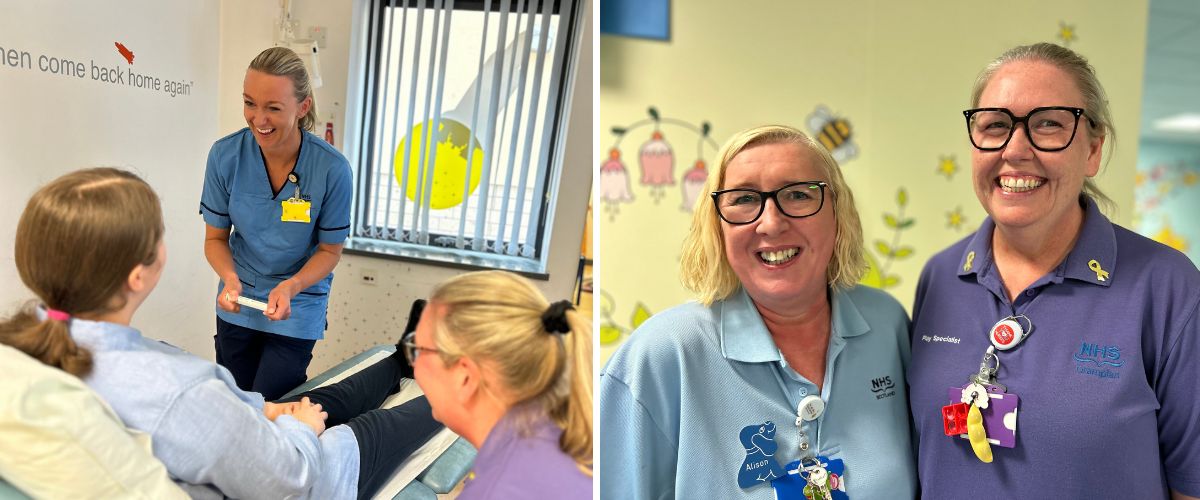Royal Aberdeen Children's Hospital offers lifeline to teenage patients with innovative home treatment
Published: 09/09/2025 07:00A pioneering approach at Royal Aberdeen Children’s Hospital (RACH) is transforming the lives of teenagers with inflammatory bowel disease (IBD), offering them greater independence, reduced hospital visits, and improved quality of life.
Seventeen-year-old *Rachel has been receiving care at RACH since being diagnosed with severe Crohn’s disease in early 2022. After an initial hospitalisation and months of nasogastric treatment, Rachel began receiving infliximab therapy – an essential medication for managing her condition – by attending the hospital as an outpatient every six weeks. This type of medication is delivered via a cannula, and the treatment takes around an hour, after the patient has seen their specialist and had the injection to have a cannula fitted.
Repeated difficulties with cannulation made the monthly hospital visits traumatic and unsustainable for Rachel who is autistic.
“Rachel was incredibly difficult to cannulate,” her mum explained. “We had months of multiple attempts, long days at the hospital, and then around a year ago we were offered the chance to move to a different kind of treatment at home which has made a massive difference to our lives in lots of ways.”
Thanks to a nurse-led initiative, patients aged 15+ like Rachel now have the option to receive infliximab using a method normally reserved for adults. It’s similar to an EpiPen and involves injecting the medication into tissue between the skin and muscle, taking just 10 seconds at a time. It allows patients to self-administer treatment at home every two weeks, and Rachel is benefitting from the support of community nurses to help her with this.
The project to make the treatment available to teenage patients was spearheaded by clinical nurse specialist Chantelle Stewart with the backing of consultant paediatric gastroenterologist Dr Iain Chalmers. Chantelle arranges for patients to receive their first injection in the hospital setting, along with initial training. She also works with community nursing teams to continue training in the home environment until patients achieve confidence in self-administration. Ongoing monitoring remains a key part of the process, with the specialist clinic team continuing to review patients.
“Previously, patients had to attend hospital every six to eight weeks for intravenous infusions, which could take several hours,” said Chantelle. “Now, with training and support, they can manage their treatment at home, giving them more control and reducing the emotional and physical toll of hospital visits. It’s working really well.”
Rachel’s mum says the change has had a profound impact. “It’s not just about convenience,” she added. “It’s about dignity, confidence, and knowing she will get the treatment she needs. For Rachel, it really has been absolutely paramount in keeping her in remission.”
The hospital’s play service team has also played a vital role in Rachel’s journey. “They’ve been a lifeline,” her mother said. “From waiting outside theatres to ensuring continuity for Rachel’s autism needs, Wendy and Alison have been with us every step of the way. They feel almost like family and we are absolutely blown away by their practical and moral support at every single procedure she’s ever had. We genuinely couldn’t have managed without them.”
The hospital plans to expand the programme to eligible teens as they reach the appropriate age and clinical criteria.
Clinical nurse manager Caroline Reid commented: "As we prepare for an international inspection for delivering excellence in care as part of the hospital’s journey to achieving Magnet designation, this initiative is an example of one of many nurse-led innovation projects. It shows how our multi-disciplinary teams, working closely with patients and families, can dramatically improve outcomes for young people living with chronic illness.”
Chantelle added: “Everything we can do to improve the quality of life for young patients is so important, especially when they are teenagers navigating exams and secondary school life. We support patients from as far away as Shetland so it’s a huge benefit in terms of time and stress saving for the whole family. We are really pleased this is working well for Rachel.”
*Please note, the name Rachel is a pseudonym, to protect the privacy of our young patient and her family. We are very grateful to them for sharing their story to help highlight the fantastic work of our teams at RACH.

